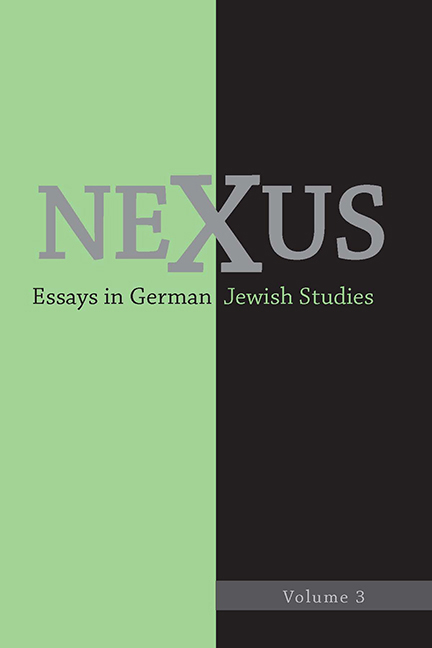Book contents
- Frontmatter
- Dedication
- Contents
- Acknowledgements
- Introduction
- “Ein weites Feld”: Ein Wort zu deutsch-jüdischen Studien anläβlich der Verleihung des ersten Egon Schwarz Prize for the Best Essay in German Jewish Studies
- “An Open Field”: A Word about German Jewish Studies on the Occasion of the Presentation of the first Egon Schwarz Prize for the Best Essay in German Jewish Studies
- Laudatio for Abigail Gillman's Prize-Winning Nexus Essay: “Martin Buber's Message to Postwar Germany”
- Heinrich Heine in Modern German History, by an Eyewitness
- Jeffrey Sammons, Heine, and Me: Some Autobiographical Reflections
- Heine's Disparate Legacies: A Response to Jeffrey Sammons
- My Debt to Heine and Sammons
- Die letzten Tage der Menschheit as a German-Jewish Tragicomedy, and the Challenge to Translators
- Edward Timms's “Die letzten Tage der Menschheit as a German-Jewish Tragicomedy and the Challenge to Translators”: A Response
- Kraus the Mouse? Kafka's Late Reading of Die Fackel and the Vagaries of Literary History
- The Parable of the Rings: Sigmund Freud Reads Lessing
- The Poetics of the Polis: Remarks on the Latency of the Literary in Hannah Arendt's Concept of Public Space
- The Marrano in Modernity: The Case of Karl Gutzkow
- German Jews Dogged by Destiny: Werewolves and Other Were-Canids in the Works of Heinrich Heine and Curt Siodmak
- Authenticity, Distance, and the East German Volksstück: Yiddish in Thomas Christoph Harlan's Ich Selbst und Kein Engel
My Debt to Heine and Sammons
Published online by Cambridge University Press: 11 May 2017
- Frontmatter
- Dedication
- Contents
- Acknowledgements
- Introduction
- “Ein weites Feld”: Ein Wort zu deutsch-jüdischen Studien anläβlich der Verleihung des ersten Egon Schwarz Prize for the Best Essay in German Jewish Studies
- “An Open Field”: A Word about German Jewish Studies on the Occasion of the Presentation of the first Egon Schwarz Prize for the Best Essay in German Jewish Studies
- Laudatio for Abigail Gillman's Prize-Winning Nexus Essay: “Martin Buber's Message to Postwar Germany”
- Heinrich Heine in Modern German History, by an Eyewitness
- Jeffrey Sammons, Heine, and Me: Some Autobiographical Reflections
- Heine's Disparate Legacies: A Response to Jeffrey Sammons
- My Debt to Heine and Sammons
- Die letzten Tage der Menschheit as a German-Jewish Tragicomedy, and the Challenge to Translators
- Edward Timms's “Die letzten Tage der Menschheit as a German-Jewish Tragicomedy and the Challenge to Translators”: A Response
- Kraus the Mouse? Kafka's Late Reading of Die Fackel and the Vagaries of Literary History
- The Parable of the Rings: Sigmund Freud Reads Lessing
- The Poetics of the Polis: Remarks on the Latency of the Literary in Hannah Arendt's Concept of Public Space
- The Marrano in Modernity: The Case of Karl Gutzkow
- German Jews Dogged by Destiny: Werewolves and Other Were-Canids in the Works of Heinrich Heine and Curt Siodmak
- Authenticity, Distance, and the East German Volksstück: Yiddish in Thomas Christoph Harlan's Ich Selbst und Kein Engel
Summary
JEFFREY SAMMONS'S REMARKS inspire me to reflect on my own, far more limited, yet no less personal, involvement with Heinrich Heine. Jeffrey was in fact the person who first introduced me to Heine (and to Lessing, Schnitzler, Frisch and others) in a course titled “Germans and Jews” that I took with him at Yale in 1985, so it is a particular honor to share a few thoughts in this forum.
Jeffrey noted that he is proud of the fact that he never felt the need to use Heine to prove something. In contrast, German critics use the poet to assuage guilt towards the Jews, and others have re-territorialized this consummately original writer in the name of Judaism, liberalism, Socialism, as well as that of other literary and non-literary causes. I admire Jeffrey tremendously, and though I try to hold myself to his high standards, I must admit that I have nevertheless found Heine to be extremely “useful” in my teaching and scholarship.
Heine has played an essential role in my courses at Boston University. Heine is the very first author I ever attempted to teach as a college professor. In my course on nineteenth-century German literature, subtitled, “Zwischen Romantik und Moderne” (Between the Romantic and Modern), I begin with poems from all phases of Heine's career; excerpts from Romantische Schule; Theodor Adorno's “Die Wunde Heine”; and the Schumann settings to Buch der Lieder. What holds it all together are some key passages from Jeffrey's influential Heine biography,which explain so eloquently how and why Heine positioned himself as the simultaneous heir to and gravedigger of Romanticism. Over twenty years later, I still cannot imagine a better way of teaching students what it means to be an epigone of Romanticism, and to write lyric poetry zwischen Romantik und Moderne.
In another course, unimaginatively titled “Introduction to German Literature,” I use Heine's poetry to introduce students to lyric poetry as such: to rhyme, meter, alliteration, and so on. The poems always teach well, and they get better (and funnier) every year—especially “Sie saβsen und tranken am Teetisch,” with its clever rhyme-pair Teetisch and ästhetisch.
- Type
- Chapter
- Information
- Nexus 3Essays in German Jewish Studies, pp. 49 - 52Publisher: Boydell & BrewerPrint publication year: 2017



